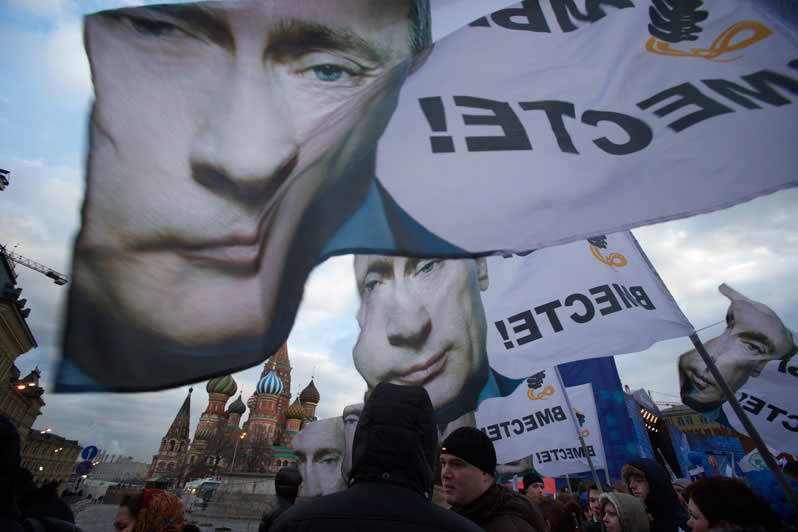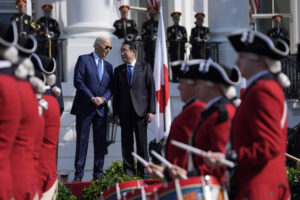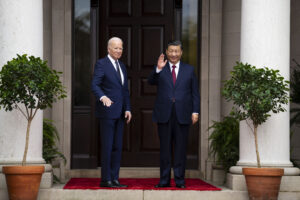The Long Telegram: Imaginary Friends and Phantom Enemies
The result of the obsessive vilification of Russia is a tragic waste of opportunities for two major nations to join in the actual wars at hand. People rally in support of Crimea joining Russia, with banners and portraits of Russian President Vladimir Putin reading "We are together" in Red Square in Moscow. AP/Pavel Golovkin
People rally in support of Crimea joining Russia, with banners and portraits of Russian President Vladimir Putin reading "We are together" in Red Square in Moscow. AP/Pavel Golovkin
Imaginary Friends
A human being is beheaded in front of other human beings in Saudi Arabia. This happens frequently– at least twice a week — in places known as “chop squares.” The punishment, along with the accompanying spectacle, is meted out for crimes that include, among others, apostasy and witchcraft.
What sounds like a chapter in a gothic historical novel is a fact of life now, a routine occurrence and a staple of the “justice system” of one of the United States’ primary allies. American presidents walk hand in hand and bow low to the desert sheiks who had mythologized austerity they no longer know. Human trafficking and child prostitution are just as endemic in the home of Mecca as are these public executions. Cynically, the talking heads and the “experts” wink at our understanding that “well, we need their oil.” And yet the geophysical companies, assessing Saudi Arabia’s resources, have long been doing “detail work” on the dwindling supplies, looking for smaller and more complex fields, because even Saudi oil is finite and will run out in the near future.
One infinite resource, however, is the amount of hatred the Saudi population has toward the United States and the West. Overwhelmingly, especially young men (in contrast, by the way, to their peers in Iran) loathe America. It is no coincidence that most of the 9/11 hijackers, as well as their mastermind, were of Saudi origin. And yet … Saudi Arabia is our ally.
In two shifts daily, plain clothed employees come to work at a nondescript building — #61398 of the People’s Liberation Army in Shanghai, China. It is just one of the locations where thousands of professional hackers break into the world’s best laboratories, universities, companies, factories and defense and intelligence infrastructures, stealing years of research and development, secrets and innovation. According to the assessments of counterintelligence in the U.S. and in the U.K., Chinese hacking is not terribly original; it is simply comprehensive and steadfast and it has been taking place for decades. What the Chinese do is not just cyber warfare; it is industrial-scale, state-sanctioned theft.
Although ideas and technology seem abstract, they are today’s gold and diamonds, the resources that trump all others, including oil and gas. Innovation is at the very heart of the modern global economy. Policies and support aimed at growing talent, its use and applications, reward its country of origin with success and prestige — but not when it is stolen. And when the thief holding your most precious loot also owns your debt, this is a double bind of your own making. It is also worth noting that China’s human rights abuses range from the tedious and classic quashing of dissent to extravagance, like in Saudi Arabia, except the Chinese do it behind closed doors. And yet … China too is our ally.
With friends like these, who needs enemies?
Phantom enemies
For nearly a century, since 1917, the United States had stuck to one — Russia. It is hard to miss on a map and it has a name and a bloody history that is as easy to reduce to a cartoon as it is with the history of Germany. Inevitably, the Hollywood baddies are either the Russkis or the Nazis. So cozy to have such enemies. Such clarity must be satisfying in a messy and confusing world. The sweet old habits kick in, and the Russia experts feel young again. Who are they?
A minority of intellectuals (writers, journalists and historians) understand Russia in profound ways, and lately they all have urged informed caution, but they are outnumbered. The ideological home for most of the advisers on Russia to the U.S. government, however, is the American neoconservative movement of yesteryear. Remember those bright bulbs who gave us the war with Iraq, applauded and, to this day, defend torture and extraordinary renditions? It’s them. They’re back.
You can recognize them quickly by their flabby asses upon which they safely sit and advise our government to send the young to wars. They have favored not only torture but also illegal surveillance and suggest other such methods that would have made the KGB and the Stasi proud. They were the ones who thought that Russia — an empire in possession of nuclear, chemical and biological bombs — must become a failed state. Thank you, geniuses.
One would have thought that after the Vietnam and Iraq wars, they’d implode. No. The neocons come back like a bad smell. The frightening thing: They are the ones who explain Russia to the Americans and who advise policy. And for the past two decades, they have insisted on treating Russia as a defeated nation while, strangely, also as an enemy, spreading NATO installations and planning an anti-ballistic missile shield right at Russia’s borders — a move even former U.S. Secretary of State Robert Gates described as “a grave mistake.” The United States keeps denouncing Russia’s human rights record which, granted, is not stellar, but it is a far cry from destroying Iraq, sanctioning torture and renditions, droning and bombing within territories of other sovereign nations and conducting comprehensive surveillance. Russia certainly does not have the gothic flair for publicly decapitating human beings for witchcraft.
The result of the obsessive vilification of Russia is a tragic waste of opportunities for two major nations to join in the actual wars at hand: against extremism of every stripe, leveraged against radical states in possession of the dwindling energy supplies, against theft of intellectual property and mitigating climate change. Neither China nor Saudi Arabia can join the U.S. because they are on the other side of those wars.
At this very moment, the United States is reasserting its ties with these two countries that have damaged its interests and security the most in recent years and whose human rights abuses dwarf those of Russia’s.
Containment of Self
It is understood here and repeated ad nauseam that Russia made Ukraine choose between the European Union and itself, yet it was Jose Manuel Barroso, president of the European Commission, who was the first to tell Ukraine, “Either a Customs Union with Russia or contract with us,” thus opening Pandora’s box with this ultimatum and provoking a mirror ultimatum by Russian President Vladimir Putin. Both said “either us or them.” Ukraine is and always has been split between East and West, and now the gauntlet has been thrown. After centuries of bloody history over that very issue, Ukrainians had to decide on the spot. What followed in Maidan Square was not inevitable, but it was a logical reaction of the two opposing forces within Ukraine itself over the East-West split, in which western Ukraine wants to be part of Europe and the east and the south, including Crimea, lean eastward — to Russia.
More than 93 percent of Crimea’s voters declared a desire to be part of Russia (as the area had been for more than 200 years). Russia ratified the Crimean referendum based primarily on its own interests, national and historical self-definition as well as on the legal precedent set in 1999 by the U.S. and NATO in Kosovo. That referendum was acknowledged by the international community after the ethnic killings on both sides and 72 days of NATO-led bombing in the former Yugoslavia. This time, however, the United States decided the situation was different, declared sanctions and took a “stand.” The neocons dusted themselves off and are trolling cyberspace and the airwaves, urging “action” and raising the rhetoric of the Cold War to its highest pitch since the ’70s. Russophobia is back in. Naturally, anti-Americanism in Russia is resurfacing in response. But we were back to the old days, even before the events in Ukraine. “Something will detonate,” said House Homeland Security Committee Chairman Michael McCaul, referring to the Sochi Olympics. The entire coverage of the Olympic Games was permeated with this sentiment. Sometimes, it sounded almost hopeful. Then came Maidan Square.
As happened during and after the Arab Spring, as well as in the protests in Syria, radicals on all sides got inspired, joined in and came to the fore. They always do. The U.S. and Russia are egging on those they find convenient for their game. Ukraine is sizzling with possibilities for violence and provocation.
Have we learned nothing from the past? Do we really think that we can play old Cold War games now?
“Security in Europe is not possible against or without Russia but only with Russia. And if the crisis is overcome one day, one advantage could be that international law is finally recognized by all sides again,” said Gregor Gysi of the German party Die Linke. Few voices of reason are heard, but they are there.
Maintenance and self-reflection must be made the new sexy. Today’s containment should apply to everyone: states, the parties, militias, groups, governments and their opposition. Above all, let us praise the awareness and self-containment.
Let the specter of George Kennan and the Wise Men speak: “Much depends on health and vigor of our own society. … We must have courage and self-confidence to cling to our own methods and conceptions of human society. After all, the greatest danger that can befall us … is that we shall allow ourselves to become like those with whom we are coping.” Today, Kennan would be saying this in regard to America’s imaginary friends, not its phantom enemies. And as he did in 1946, he would certainly have now the character to say this about his own nation.
The biggest test for us now is to step close to the mirror.
Lena Herzog is a widely published photographer and author who is also a Russian American.
Your support matters…Independent journalism is under threat and overshadowed by heavily funded mainstream media.
You can help level the playing field. Become a member.
Your tax-deductible contribution keeps us digging beneath the headlines to give you thought-provoking, investigative reporting and analysis that unearths what's really happening- without compromise.
Give today to support our courageous, independent journalists.









You need to be a supporter to comment.
There are currently no responses to this article.
Be the first to respond.